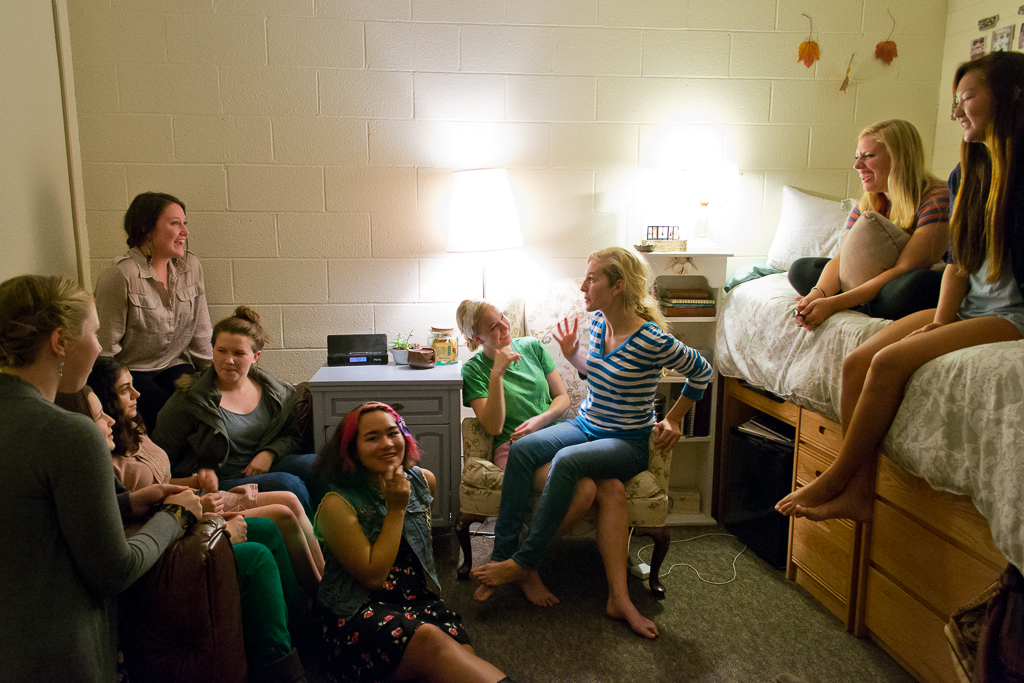
It takes more than meets the eye to be a resident assistant at Biola University. Anyone who lives on campus knows that RAs don’t just enforce open hours and report rebels; the heart of their position revolves around building a strong foundation for residents to flourish in their floor community throughout the year. With the information meeting for next year’s RA positions happening tonight in Sutherland Auditorium, students can gain insight into what many call the highlight of their Biola career.
Seeking Diverse Leadership to Foster Unique Communities
Krista Roberts, director of Resident Life, says that the goal of the RA selection process each year is to create a diverse, dynamic student leadership team. This process begins with the information meeting and its expected attendance of more than 150 interested applicants.
“The first and foremost thing that we are looking for is diversity. We want RAs to bring their unique selves,” Roberts said. “We recognize that God has created us in unique ways in our leadership, so we don’t have a certain cookie-cutter kind of person we are looking for.”
Instead, the selection committee composed of all 11 resident directors looks to mesh contrasting personalities together to create exciting and interactive relationships, according to Roberts. Thus, the RA selection process utilizes three stages to observe and evaluate applicants from a personality and relational standpoint: written application, group process — team building exercises and scenarios — and one-on-one interviews with one or multiple RDs.
“We look for a warmth in an individual,” said Andrew Rae, RD of Hart Hall and the head of last year’s selection committee. “We also look for someone with a learner mentality and who is excited to serve.”
Building Deeper Relationships
Grace Berding, a Sigma Hall RA, said that her decision to view the role of an RA as a ministry instead of a job allowed her to learn more than she expected.
“You need to view it as something God is calling you to make a year commitment to,” said Berding, a junior double-majoring in communication disorders and biblical studies. “If you don’t view it as a ministry, you won’t be willing to take a risk and knock on people’s doors and talk to them.”
In fact, Berding said that it was this ministry of intentional relationship building that attracted her to her position on third-floor the Vine in the first place.
“That moment when a girl opens up to you or is going through something really hard and chooses to include you … I think that is the moment when I realize why God has me in this position,” Berding said.
Maddie Gettings, a sophomore biblical studies major and a Hart Hall RA, agreed with Berding that the primary role of an RA was forming meaningful relationships.
“More than anything else, its about facilitating a place where girls feel comfortable to come home to,” Getting said. “Other things like planning events and student care center on the idea of making their home a comfortable place to be.”
Fostering Intentional Community
Besides building relationships with individual students, every RA strives to encourage community friendships on his or her floor and with the rest of the residence hall. The RA selection committee and the dorm’s resident director seek to match each RA to fit each residence hall team in order to have the greatest amount of ease and impact with students, according to Rae.
Although sophomore Thomas Harlander, RA in North Horton Hall, was initially nervous about the vibe of the floor, he was pleasantly surprised at how much he loved his floor’s eccentric personality.
“The guys are really quirky and goofy,” Harlander said. “The other day we did floor photos and everybody showed up in ridiculous clothes. We all were just goofing off.”
Although encouraging student interaction and developing relationships is one of the main roles of an RA, such intentional community building can sometimes be the most difficult aspect of the job. Jeremy Pedron, the resident coordinator of the La Mirada Apartments, turned to more inventive ways to get residents involved and interacting with each other.
“We created this whole progressive dinner,” second-year Talbot student Pedron said, describing how the residents moved through a different room for each course of the meal. “Eating together is so special, but also being inside somebody’s space encourages so much movement in relationships that it really opened up our community.”
Pedron, a fourth-year veteran of Residence Life and a third-year resident coordinator, emphasized the importance of students interested in serving as RAs simply seeking God’s will and maybe stepping out into that leadership role as a leap of faith.
“It’s being open to something God would want you to do, instead of already deciding against it,” Pedron said. “Just be open and not afraid of failure. … When people arrive as themselves, that is the most powerful resume you could have.”







